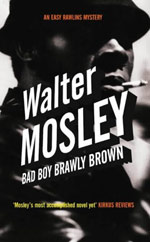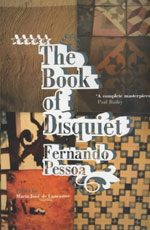Now and Then and Now Again
| |

| I'm always intrigued by writers who have successful series. I'm always fascinated by how often when those writers stray from the series, the quality of the work suffers. Sometimes, like with Lawrence Block, there are even whole series that seem to be significantly inferior to others: compare, say, his burglar series with the Matt Scudders. No comparison. Or Charles Willeford, who for me is at his finest in the Hoke Moseley series, although admittedly there are several of his other titles that are almost on a par. James Sallis too, whose Lew Griffin novels are of course peerless, but whose Death Will Have Your Eyes frankly isn't; not by a long chalk. Then there's Walter Mosley. I first read Mosley several years ago and was immediately hooked. I thought that Mosley's series revolving around Easy Rawlins was amongst the best I'd read and ranked up there with my favourites from Block, Chandler, Pelecanos and Ross MacDonald. Easy Rawlins was clearly a special character, and Mosley seemed a special writer. My faith was shaken though, by the books he penned in what seemed to be a hiatus from Easy. I found the sci-fi Blue Light unreadable nonsense; Walking The Dog was mediocre at best; Fearless Jones rated much better than average but still not up to the high standard I'd expected after the brilliance of the likes of Black Betty, A Little Yellow Dog and Devil In A Blue Dress. I yearned for a return to form, and a return of Easy Rawlins. In Bad Boy Brawly Brown (Serpents Tail), my yearnings are answered. Rawlins returns, and with him, Mosley is back on top form. The whole Easy Rawlins series is of course in part a history lesson of post-War Black America, and specifically the history of post-War Black Los Angeles. So with Bad Boy Brawly Brown, we're up to the early 1960's, with LA simmering and about ready to boil over in the Watts riots of '65. Easy, unable to resist an old friends' request to find his step-son (one Brawley Brown), is pulled into this pre-contagion world of political activism, extremist Direct Action and the attendant hypocrisy, surveillance and selling-out that inevitably seems to go hand in hand with such things. It's all pretty bleak and unforgiving. There's a lot of lost faith, a lot of idealism going down the drain, drowned by jealousy and greed. There's a lot of resigned fatalism, and not really much to take comfort from, except perhaps the strength of Easy Rawlins' convictions and love for his family and friends. And maybe this is what really matters. To pull Jim Sallis back in though, I can't help but want to compare Mosley's Rawlins books with Sallis' Griffin series. Both are to a large extent 'about' the history of Black Post-War America, but regardless of how entertaining and readable Mosley's books are (and they most assuredly are), it's Sallis who really seems to have taken the whole concept to a new level. I guess it's to do with structure. Mosley is a traditional story-teller. There are beginnings, middles, endings. He packages up the history neatly into decades and lets one book deal with one era, just like Pelecanos and his Washington DC books. This is all fine and well, except really that's not how we understand, or experience history. Or even time. Instead, our experience, our knowledge of history is felt through myriad threads, all of which interweave around our present. There is ebb and flow, constant flux between past and present. It's this flow that Sallis expertly achieves in the Lew Griffin series; that Mosley doesn't really even begin to attempt to address in the Rawlins' books. Which isn't a criticism per-se, and Bad Boy Brawly Brown is still a damn fine novel, it's just that having read Sallis in the intervening years since my infatuation with the previous Mosley books, I'm left wanting that little bit more. |

| Also published recently by Serpents Tail is Fernando Pessoa's legendary The Book Of Disquiet. It's a book I'd heard a lot about in the past and always had on one of my lists of 'must investigate this'. It's also a book that I would no doubt have considered hugely important and influential if I'd read it when I was in my late teens or early twenties, but feel rather less enamoured with now. Which really is being more than a little unfair. I'm still enamoured with it. It still reads beautifully, and there are many, many lines of poetic existentialism that strike me as delightful Truths. It's just that such Truths don't seem quite as pertinent to the me of Now as no doubt they would have been to the me of Then. It all feels too wordy, a book staring too deeply at its own navel, and mistaking misty shadows for the Soul. And whilst that inner search is often illuminating and beautifully structured, I can't help but feel the urge to grab Pessoa by the lapels and shake him vigorously. Not that it would do much good of course, him being dead since 1935 and all. The Book of Disquiet, being essentially a diary of Pessoa's time as assistant book-keeper in Lisbon's Rua Des Douradores, feels to me like Proust's Remembrance of Things Past; a grand Idea, but not really a very thrilling Reality. A 'masterpiece' it might well be, but it's also one of those things you end up filing away as 'Important' but in the end not really all that enjoyable. © 2002 Alistair Fitchett |